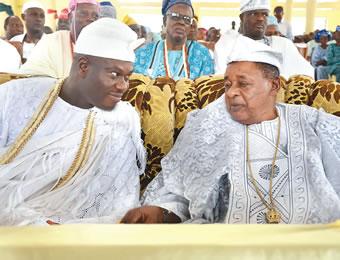In the annals of history, details have emerged regarding the salaries of traditional rulers in Southern Nigeria during the colonial period. These revelations shed light on the remunerations allocated to prominent figures such as the Alaafin, Alake, and Awujale, among others. However, conspicuously absent from this record is the Oba of Lagos, prompting varied reactions and raising questions about the criteria employed in determining these salaries.

Colonial Era Salaries
A recent disclosure, facilitated by media personality Bolanle Oni Story, highlights a document dating back to January 1938, sourced from the Federal Ministry of Information’s archives. This document delineates the remunerations assigned to several traditional rulers. Notably, the Alaafin of Oyo topped the list with a salary of €4,200, followed by the Alake of Egbaland at €2,250 and the Awujale of Ijebu at €1,700. The Oba of Benin and the Ooni of Ife received €1,650 and €1,400, respectively.
Secondary Figures
Additionally, the document unveils the salaries of second-tier traditional rulers, including the Olubadan of Ibadan (€2,400), Owa of Ilesha (€1,450), Oshernowe of Ondo (€350), and Oragun of Ila (€200).
Public Response
The disclosure of these historical salaries has sparked widespread reactions across social media platforms. Many Nigerians have taken to expressing their thoughts and queries regarding this revelation. Of particular concern is the absence of the Oba of Lagos from the documented list, prompting speculations and discussions on the colonial administration’s approach to remuneration and its implications on the traditional hierarchy.
The salaries of the first and second class of the Obas in yoruba land during colonial era.
— Bọ́láńlé oní story 🖋️ (@tyewoolove) April 4, 2024
Photo source: History and the Yoruba people (Adebayo Abayomi) pic.twitter.com/o2UiaCEkCk
What was said
Various individuals have offered insights into the possible reasons behind the disparities in salaries among traditional rulers. One social media user, @anlugua_Ibadan, highlighted the historical context, suggesting that these salaries were likely influenced by the colonial masters’ perceptions and relationships with the respective traditional rulers.
As historical documents continue to resurface, they offer invaluable insights into the past, prompting reflection and dialogue on the intricacies of governance, power dynamics, and socio-cultural hierarchies. The unveiling of traditional rulers’ salaries during the colonial era serves as a testament to the complexities of historical narratives and their enduring impact on contemporary discourse.
@anlugua_Ibadan said:
“The Alaafin received so much preferential treatment from the British government because the Alaafin Siyanbola Ladigbolu and Capt W.A Ross were great friends.
“During this period, Alaafin was placed ahead of other southern monarchs, and Ibadan was politically placed under Oyo.”
Another, under Olamillion, took to the post’s comment section to express his reaction. He said:
“How Alaafin of Oyo go dey collect pass Oni of Ife.? Oni na number one king in Yoruba land nah.”
OMOTAYO of Lagos asked about the omission of the Oba of Lagos from the document.
She wrote:
“Where is Oba of Lagos?” Dr. Vincent Ahonsi questioned the document’s authenticity, citing modern fonts and others.
He wrote:
“There were no computers then. How come this document appears computer-typed with the fonts visibly modern?”
David Copperfield traced the anomalies in the historical document to another history book.
He wrote:
“It appears that you don’t really know the story behind this anomaly! Ever heard of Professor JA Atanda’s “The New Oyo Empire”? I advise you to study this review of the book.”
Read also:
- Ahmad and Aisha Yesufu clash over Bobrisky due to Kano Govt’s ban on cross dressing films
- Kano State bans films promoting violence and cross-dressing
- Man Shows Tasty Meals Air Peace Gave Him on London-Lagos Flight
- Bobrisky Arrested by EFCC
- Nathaniel Bassey petitions IGP for action against defamation
- Ajakaju Review: Beast of Two Worlds’ Falling Short of Expectations Despite Hype
- 16 Sex Positions for Intense Penetration
- Top 15 Universities in Nigeria Unveiled for 2024
- Taylor Swift Makes Forbes Billionaire List



